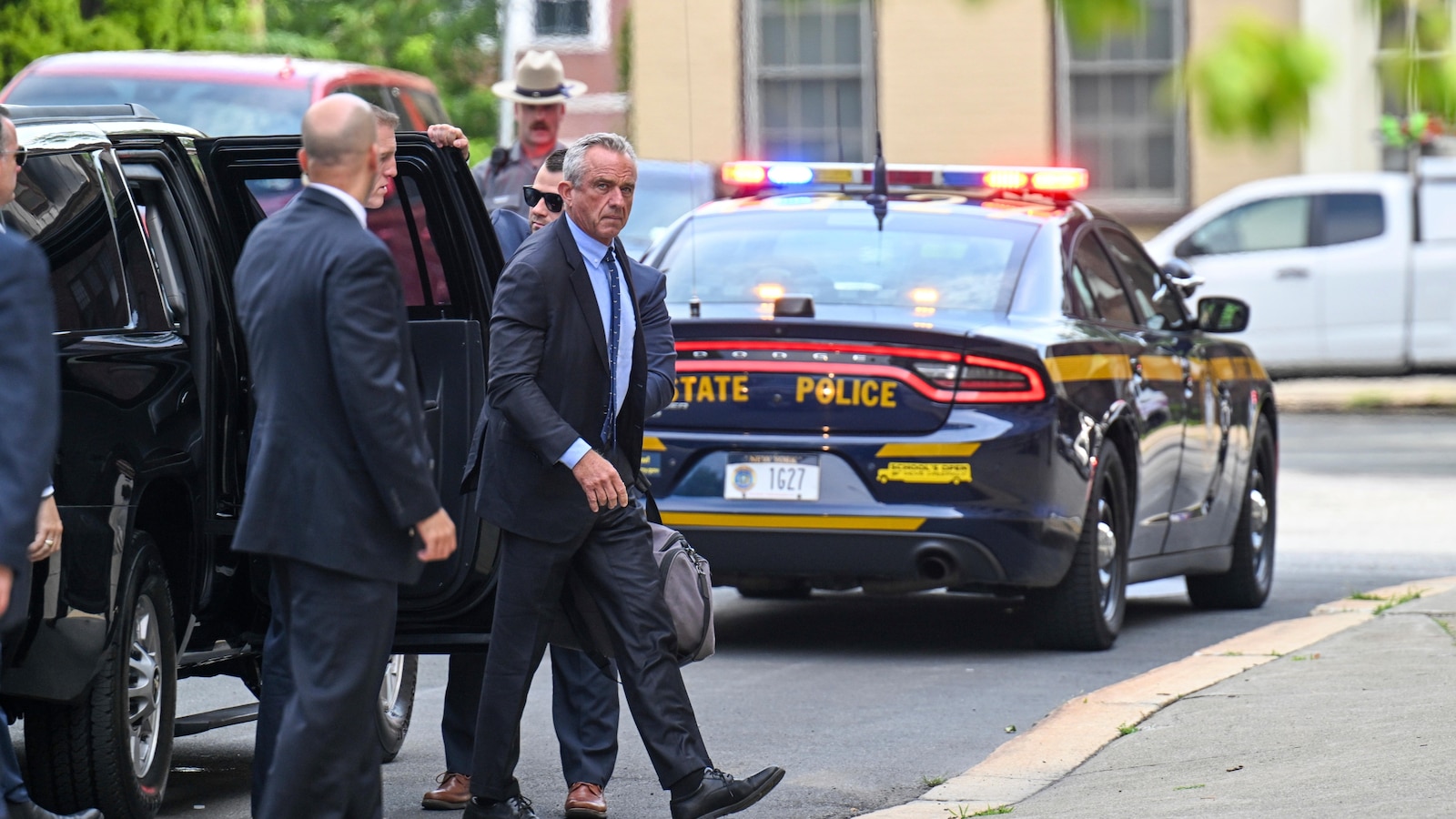
ALBANY, N.Y. — Independent presidential candidate Robert F. Kennedy Jr. appeared in a New York court Monday to fight a lawsuit alleging he falsely claimed to live in New York as he sought to get on the ballot in the state.
Kennedy sat at his attorneys’ table, occasionally jotting down notes, as the civil trial began in the state capital of Albany. Under state election law, a judge is set to decide the case without a jury.
The lawsuit alleges that Kennedy’s nominating petition falsely said his residence was in New York’s northern suburbs while he actually has lived in Los Angeles since 2014, when he married “Curb Your Enthusiasm” actor Cheryl Hines.
The suit seeks to invalidate his petition. The case was brought by Clear Choice PAC, a super PAC led by supporters of Democratic President Joe Biden.
“Candidate Kennedy does not reside in the state of New York,” said attorney Keith Corbett in his opening argument.
Kennedy has the potential to do better than any independent presidential candidate in decades, having gained traction with a famous name and a loyal base. Strategists from both major parties worry that he could win enough votes to tip the election.
His campaign has said he has enough signatures to qualify in 42 states, so far. His ballot drive has faced challenges and lawsuits in various states, including North Carolina and New Jersey.
Kennedy’s New York ballot petition lists his residence as a home that a friend owns in Katonah, a tony suburb about 45 miles (72 kilometers) north of midtown Manhattan. But the lawsuit claims that the candidate “has no meaningful or continuous connections to the property” and has spent “vanishingly little time, if any.”
He doesn’t have a written lease, and neighbors haven’t seen him around, says the lawsuit, filed in June.
“Moreover, the evidence will show that Kennedy’s wife and children live in California, along with his three dogs, two ravens, an emu and his personal belongings,” the lawsuit adds.
Kennedy’s lawyers maintain that the 70-year-old candidate — who led a New York-based environmental group for decades and whose namesake father was a New York senator — has lived in the state since he was 10.
“While Mr. Kennedy may have purchased a home in California and temporarily moved his family there while his wife pursues her acting career, Mr. Kennedy is and always has been a New Yorker,” his lawyers wrote in a court filing.
In legal arguments ahead of the trial, Kennedy attorney F. Michael Ostrander said his client has a “continuing connection” to the Katonah area.
According to the court filing, Kennedy visits the Katonah house as often as possible while campaigning, pays New York state income taxes and pays rent to the owner of the house in Katonah. There he gets mail, is registered to vote, is licensed to practice law, keeps clothes and family photos, has a car registered and has it as his address on his driver’s license and various others.
“He even keeps his beloved falcons in New York state,” attorney William Savino said in a press release Monday. He said Kennedy intends to move back to New York as soon as his wife retires from acting.
The court date comes the day after a video posted on social media showed Kennedy explaining a New York episode in his life: how a decade ago he retrieved a bear that was killed by a motorist and left it in New York’s Central Park with a bicycle on top.
___
Associated Press writer Jennifer Peltz contributed from New York.
Robert F. Kennedy, the son of former Attorney General and presidential candidate Robert F. Kennedy, is facing a ballot-access lawsuit in New York court over a residency dispute. The lawsuit, filed by a group of voters in the state, alleges that Kennedy does not meet the residency requirements to run for office in New York.
Kennedy, who is running for the U.S. Senate seat currently held by Senator Chuck Schumer, has been accused of not meeting the state’s residency requirements, which mandate that candidates must have lived in New York for at least five years prior to running for office. The lawsuit claims that Kennedy has not met this requirement, as he only moved to New York in 2019.
Kennedy has defended his residency status, stating that he has been living in New York since 2019 and has established roots in the state. He has also pointed out that he has been an active member of the community, participating in various events and initiatives to support New Yorkers.
The lawsuit has sparked a debate over the interpretation of residency requirements for political candidates. Some argue that Kennedy’s move to New York in 2019 should be sufficient to establish residency, while others believe that he should have lived in the state for a longer period of time before running for office.
The outcome of the lawsuit could have significant implications for Kennedy’s candidacy and the U.S. Senate race in New York. If the court rules in favor of the plaintiffs, Kennedy may be disqualified from running for office, potentially reshaping the race for the Senate seat.
Overall, the ballot-access lawsuit against Robert F. Kennedy highlights the complexities and challenges of running for political office, particularly when it comes to meeting residency requirements. As the case unfolds in court, it will be interesting to see how the legal system navigates these issues and what impact it will have on Kennedy’s candidacy and the upcoming election.


